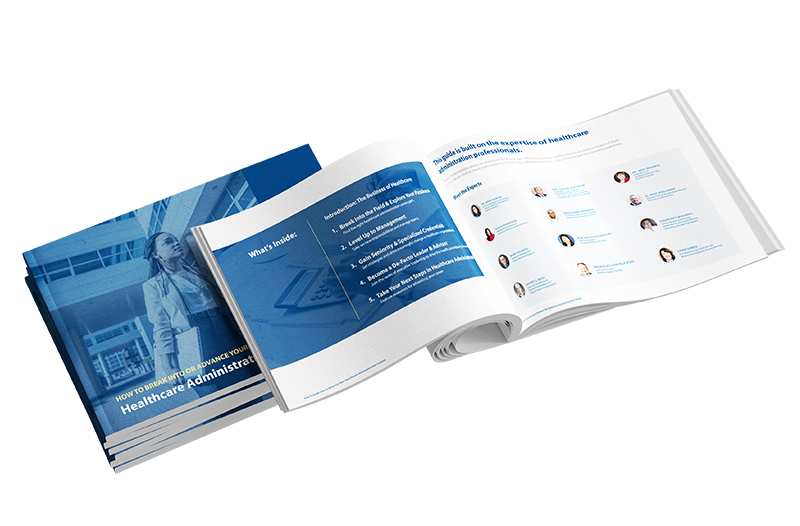Request Information
We're Sorry
There was an unexpected error with the form (your web browser was unable to retrieve some required data from our servers). This kind of error may occur if you have temporarily lost your internet connection. If you're able to verify that your internet connection is stable and the error persists, the Franklin University Help Desk is available to assist you at helpdesk@franklin.edu, 614.947.6682 (local), or 1.866.435.7006 (toll free).
Just a moment while we process your submission.

Explore What Jobs You Can Get With a Healthcare Administration Degree
Are you considering a healthcare career but prefer to work behind the scenes rather than directly with patients?
A degree in healthcare administration might be the perfect fit for you. This field offers a unique blend of business management and healthcare expertise, opening doors to many exciting and rewarding career opportunities.
Below, we'll explore the various jobs you can pursue with a healthcare administration degree, helping you make an informed decision about your future career path.
Understanding Healthcare Administration
Before we dive into specific job roles, let's take a moment to understand what healthcare administration entails.
As Dr. Mary Bynum, program chair of healthcare administration at Franklin University, aptly puts it:
"Healthcare administration is a broader degree that encompasses many facets of healthcare, including management and organizational leadership. It provides students with access to an array of healthcare administration jobs and teaches skills that can be useful across a large number of career pathways."
At its core, healthcare administration involves managing healthcare facilities, services and resources to ensure efficient and effective patient care. It plays a crucial role in bridging the gap between medical staff and administrative functions in healthcare organizations.
As a healthcare administrator, you'll be responsible for overseeing the business aspects of healthcare delivery, ensuring that medical facilities run smoothly and efficiently while maintaining high-quality patient care.
The Value of a Healthcare Administration Degree
When you pursue a bachelor's degree in healthcare administration, you'll gain a diverse set of skills that are highly valued in the healthcare industry. These include healthcare policy knowledge, financial management, information systems expertise, organizational leadership and healthcare management.
Dr. Bynum notes that effective communication, collaboration, decision-making, planning, assessment and network building are also competencies that a healthcare administration degree can teach you.
These skills will not only make you a valuable asset to healthcare organizations but also set you up for better long-term career success.
Is a healthcare administration degree the right choice for you? Read this before making your choice!
Top Jobs for Healthcare Administration Graduates
With healthcare being in high demand, the career potential for healthcare administration graduates is exceptionally promising.
According to Lightcast, jobs in healthcare administration are projected to increase by 16% across the U.S. through 2032. This growth rate is much faster than the average for all occupations, which the Bureau of Labor Statistics expects to average 2.8%.
As a healthcare administration graduate, you'll be well-positioned for various attractive roles in the rapidly growing healthcare sector, including, but not limited to, the ones below.
Medical and Health Services Manager
In this position, you'll oversee the operations of healthcare facilities or specific departments within them. Your primary focus will be improving efficiency, ensuring regulatory compliance and managing staff.
Key responsibilities include:
- Developing and implementing policies and procedures
- Managing budgets and finances
- Ensuring compliance with healthcare laws and regulations
- Coordinating with medical staff and department heads
- Monitoring and improving the quality of healthcare services
Median annual salary (Lightcast): $109,741
Healthcare Administrator
Healthcare administrators manage the business aspects of healthcare organizations, including budgeting, scheduling and facility operations. In this role, you'll work in various settings such as hospitals, clinics, nursing homes and public health agencies.
Key responsibilities include:
- Developing and managing organizational goals and objectives
- Overseeing financial operations and budgeting
- Ensuring compliance with healthcare regulations and policies
- Managing human resources and staff development
- Coordinating with medical staff and other healthcare professionals
Median annual salary (Lightcast): $63,315
Advance your career in Healthcare Administration while you advance patient care. Download your free career guide.
.png)
Healthcare Consultant
Healthcare consultants analyze a healthcare organization's operations and recommend improvements in efficiency and quality. This role requires strong analytical abilities, excellent communication skills and in-depth knowledge of healthcare systems.
Key responsibilities include:
- Conducting assessments of healthcare organizations
- Identifying areas for improvement in operations and patient care
- Developing and implementing strategic plans
- Advising on regulatory compliance and risk management
- Guiding technology implementation and optimization
Median annual salary (Lightcast): $83,685
Hospital Administrator
Hospital administrators oversee all aspects of hospital operations, from finance and human resources to patient care quality. This role comes with unique challenges, such as managing diverse staff, ensuring 24/7 operations and navigating complex regulations.
Key responsibilities include:
- Developing and implementing hospital-wide policies and procedures
- Managing budgets and financial operations
- Ensuring compliance with healthcare laws and accreditation standards
- Coordinating with medical staff, department heads and board members
- Overseeing quality improvement initiatives
Median annual salary (Lightcast): $106,350
Nursing Home Administrator
Nursing home administrators manage long-term care facilities, focusing on both resident care and business operations. This role requires a unique blend of healthcare knowledge, business acumen and compassion for elderly and disabled residents.
It's important to note that nursing home administrators must be licensed in most states, which typically requires passing a national licensing exam and meeting state-specific requirements.
Key responsibilities include:
- Ensuring high-quality care for residents
- Managing facility operations and finances
- Ensuring compliance with state and federal regulations
- Coordinating with medical staff and caregivers
- Developing and implementing policies and procedures
Median annual salary (Lightcast): $111,301
Health Information Manager
Health information managers are responsible for maintaining and securing patient records and other healthcare data. This role requires a blend of healthcare knowledge and IT skills, especially as electronic health records become standard in the industry.
Key responsibilities include:
- Overseeing the implementation and maintenance of electronic health record systems
- Ensuring data security and privacy compliance (e.g., HIPAA regulations)
- Managing health information technology systems
- Analyzing healthcare data to improve patient care and organizational efficiency
- Training staff on proper data management and security protocols
Median annual salary (Lightcast): $110,680.png)
Emerging Opportunities in Healthcare Administration
As the healthcare industry continues to evolve, new opportunities are emerging for healthcare administration graduates. These roles often combine traditional healthcare management skills with expertise in emerging technologies and patient-centered care approaches. Here are a few examples.
Telemedicine Management. Coordinate virtual healthcare services and ensure smooth operations of telehealth platforms.
Median annual salary (Lightcast): $76,025
Healthcare Analytics. Use data to improve patient outcomes, reduce costs and enhance operational efficiency.
Median annual salary (Lightcast): $87,424
Patient Experience Coordination. Focus on improving overall patient satisfaction and engagement throughout the care journey.
Median annual salary (Lightcast): $67,600
Curious about what else you can do with a healthcare administration degree? Find out more here!
Advancing Your Career With a Healthcare Administration Degree
As you move toward a degree in healthcare administration, it's important to consider strategies for long-term career growth and success.
As Dr. Bynum points out, continuing education is one key aspect of advancement in this field.
"Some healthcare administration careers may require an advanced degree, depending on the organization, etc., to advance in the field. This may be challenging for some, so it's important to look at the necessary educational requirements for your desired career path."
Pursuing a bachelor's degree and/or a graduate-level program can open doors to higher-level positions and increase your earning potential.
In addition to formal education, obtaining industry-recognized certifications may also significantly boost your credibility and marketability.
Certifications like the Certified Healthcare Administrative Professional (CHAP) can help demonstrate your expertise and commitment to the field. These credentials can set you apart from other candidates and may be required for certain leadership positions.
.png)
Why Choose Franklin University's B.S. in Healthcare Administration?
By choosing Franklin University's B.S. in Healthcare Administration, you're investing in a program that combines academic rigor with practical, industry-aligned education. This combination will equip you with the knowledge, skills and connections needed to thrive in the dynamic and rewarding field of health services.
Explore Franklin's B.S. in Healthcare Administration program or start your application today and take the first step toward a rewarding future in healthcare leadership!





